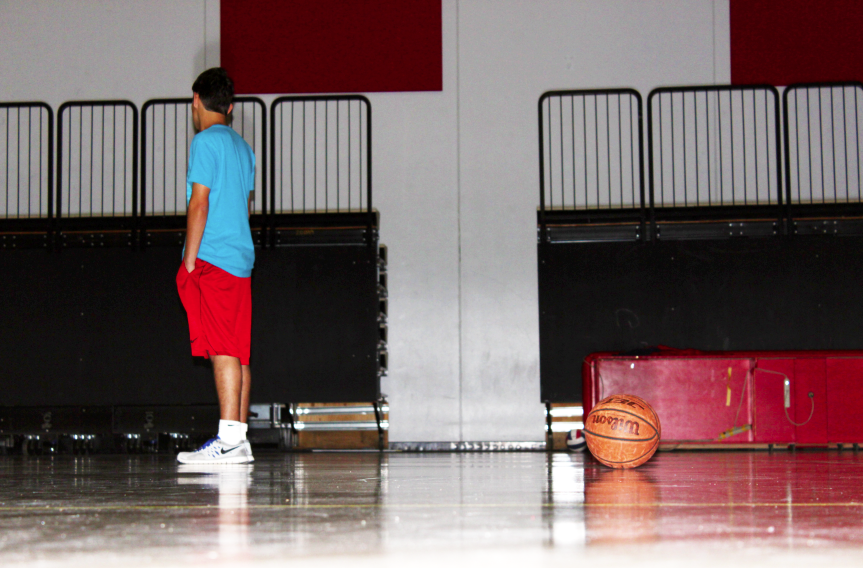College athletics not for everyone
Due to their intense practice and competition schedule, the life of a college athlete may not be for everyone.
With two WIAA State singles tennis championships and a top-100 national ranking, no one was surprised when Elizabeth Konon, Class of ‘14, received full-ride scholarship offers from Michigan State and the University of Minnesota, two Division 1, Big Ten conference schools with excellent tennis programs.
Many, however, were surprised about her decision.
After ten years of exceptional success on the junior tennis circuit, Konon forwent a collegiate tennis career in favor of an education at the University of Wisconsin – Madison, a decision that better suited her long term career goals.
“I want to major in science and between practices, workouts and traveling, it was just too much,” Konon said.
In today’s ultra-competitive, sports-oriented society, parents and coaches often breed young children to become college athletes – preferably full-ride scholarship recipients. Even prior to middle school graduation, many young athletes begin analyzing their college options. Sometimes, however, these teenagers forget that they are student-athletes – not athlete-students.
According to New York Times reporter Gary Gutting, “The term ‘student-athletes’ implies that all enrolled students who play college sports are engaged in secondary (‘extracurricular’) activities that enhance their education.”
The fact that “collegiate student-athletes may spend more than 40 hours a week practicing,” according to Business Insider, however, does not scream “student-athlete.” The fact that “twenty-one college football players have collapsed and died during conditioning workouts since 2000,” according to The Washington Post, further destroys the claim that a collegiate athletic career only serves to “enhance” a college education.
A student’s education is not enhanced if that student doesn’t survive past graduation.
In January, Rashanda McCants, former University of North Carolina- Chapel Hill (UNC) basketball player, and Devon Ramsay, former UNC football player, filed a lawsuit against UNC and the NCAA, “alleging they were deprived of a high-class education because of substandard courses,” according to The Washington Post.
According to the lawsuit, “From 1989 to 2011, under the supervision and regulation of the NCAA, UNC steered hundreds of college athletes into sham ‘paper classes’ that they were not required to attend, that required little to no work, that were not taught by a faculty member.”
Furthermore, the lawsuit cited a study proving UNC’s disregard of the NCAA’s 20 hour-per-week practice limit, with baseball players, male basketball players, FBS football players, FCS football players and female basketball players practicing an average of 42.1, 39.2, 43.3, 41.6 and 37.6 hours per week in 2010, respectively. On average, all other NCAA men’s sports practiced 32 hours per week, and all other NCAA women’s sports practiced 33.3 hours per week, according to the study.
Of course, all college athletic programs are different, but nevertheless, according to Mardee Merar, Class of ‘14 and tennis player at the University of Wisconsin-Milwaukee, “Being a college athlete is a lot of work. Being able to juggle classes, studying, practice and workouts is a lot, especially because you’re expected to show up everyday at practice and give 110 percent effort and no excuses.”
For Merar, a typical day involves waking up at 6 a.m. and attending a two hour practice. Afterwards, she grabs a quick bite to eat before rushing to class. She completes another workout before attending her second class of the day, and spends her weekday evenings studying. She wakes up to do the same thing all over again, exuding a high level of intensity and dedication every single day.
Bombarded with pressure from parents, coaches and themselves, some athletes have inevitably lost passion for their sport, yet attempt to pursue a collegiate career regardless. If the love for a sport does not overpower the hate, however, there is truly no point in forcing oneself through four years of the most grueling, high pressure scenarios of an athlete’s life.
“In college, any sport is so intense that if you don’t absolutely love it you will be miserable,” Konon said.
Those motivated by the dream of a full ride scholarship should think again, as the odds of attaining this universal goal are slim. According to CBS News, only 2 percent of high school athletes will receive an NCAA athletic scholarship.
Even the lucky few do not always understand the repercussions of a “free” education. Although scholarship athletes do not pay with dollars, they do pay with blood, sweat, tears and sacrifice.
“Kids who have worked their whole life trying to get a scholarship think the hard part is over when they get the college money,” Tim Poydenis, scholarship baseball player at Villanova University, said in a New York Times article. “They don’t know that it’s a whole new monster when you get here.”
“We miss all these classes, which obviously doesn’t help us or make our professors happy. We give up almost all our free time. Our social life is stripped bare,” Polydenis added.
With the scholarship dream out of reach for 98 percent of athletes, throwing away thousands of dollars for private coaches, personal trainers and travel teams is pointless for athletes if the motivation and passion are no longer there.
To pay for her exclusive travel soccer team, an anonymous junior shared her family spends $5000 every year. “It’s probably another $2000 a year for private coaches and equipment,” the student said. “I’ve been playing competitively for ten years.”
Ten years and $70,000 later, this student could have already paid for college without the scholarship she desires. If she does attain the scholarship dream, the high pressure life of a college athlete may quickly drive her away.
“The life of the scholarship athlete is so arduous that coaches and athletes said it was not unusual for as many as 15 percent of those receiving athletic aid to quit sports and turn down the scholarship money after a year or two,” Bill Pennington said in his article, “It’s Not an Adventure, It’s a Job.”
Ultimately, students attend college to attain an education, hence the term “student-athlete.” Student is listed first for a reason, but due to an intense athletic training and competition schedule, college athletes often experience difficulty keeping up with school work. For student-athletes highly concerned about academics, college athletics may hinder their academic goals.
“I really wanted to [play college tennis] but it’s just too big of a commitment,” Konon said. “I’m beyond stressed as it is, so I can’t imagine having tennis and workouts every day.”
Konon, therefore, participates in club tennis at UW-Madison. Konon and her teammates captured the USTA Tennis on Campus Midwest Championships on Feb. 22, and will head to North Carolina for Nationals on April 9.
“I love club tennis because I still get to play the sport I love but I don’t have to dedicate my entire life to it,” Konon said.
I am not arguing that all student-athletes should forgo a collegiate athletic career. Intrinsically motivated athletes who are prepared for added academic stress and who wholeheartedly yearn to continue their sport in college should, without a doubt, shoot for this goal.
“I’m exhausted by the end of the day but it’s all worth it,” Merar said. “I love being a college athlete.”
However, for the athletes who count down the seconds until practice is over, who dread spending another weekend at a competition and who are sick of the suffocating pressure, what is the point of spending the next four years enduring the same process to an even higher degree?
“Burnt out athletes should not play in college because if you don’t have passion for your sport, you have nothing within you that motivates you to want to do your best,” Merar said. “How can you perform at your best if you aren’t passionate about it?”
As an athlete, I understand the burning desire to prove that the years of pain, heartbreak and sacrifice were worth it. I understand the intense love-hate relationship athletes develop with their sport and that the feelings of regret associated with giving that sport up are difficult to overcome. However, college is the threshold into a new world, and in this world, adults have the freedom to do what they want and what is best for them. The desires of often over-involved, overwhelming parents and coaches should not play a role in shaping students’ college experiences and ultimately, their lives.

Katie Starsky, a cheerful perfectionist, owns her own Pinterest book where she gets all her ideas to create what the student body calls their yearbook....






